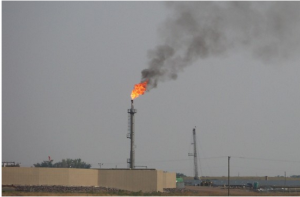In Colorado, a public database for drilling-related complaints

Courtesy of InsideEnergy
Weld County, Colorado resident Eric Ewing took this photo of a gas flare outside his home.
In Pennsylvania, the state Department of Health’s Bureau of Epidemiology logs complaints related to natural gas development in a database that the agency says is not available to the public.
StateImpact Pennsylvania has reported that department employees were also given a list of drilling-related “buzzwords” as part of a guidance on how to handle complaints. Two former health department staffers and some public health advocates question whether the state’s policies are keeping complaints from reaching the Bureau of Epidemiology for follow-up. The department of health says all complaints are investigated.
Other oil and gas states are dealing with the issue of health and drilling in different ways.
A report by Inside Energy – a collaboration of public media stations in Colorado, Wyoming and North Dakota – takes a look at how western states are responding.
In Colorado, all complaints related to oil and gas drilling are posed to a public database maintained by the state’s Oil and Gas Conservation Commission. Inside Energy also reports the database complaints from the public as well as inspections and remediations.
More from Inside Energy:
North Dakota has been tracking these concerns as well, starting about six months ago. However, that data is not readily available to the public.
Wyoming, however, doesn’t track any of this stuff yet.
“We do not get very many complaints that you would categorize specifically as a health complaint,” said Colorado Oil and Gas Conservation Commission (COGCC) Director Matt Lepore. “It’s usually potential health associated with some other kind of complaint.”
Over half of the total complaints about oil and gas concern groundwater, excessive noise, and air quality.
Eric Ewing lives near Gilcrest, in Weld County, Colorado, with his wife and two young kids. It’s an area surrounded by drilling activity. He said sometimes, when the wind is low, the air gets socked in and his family has been experiencing nausea, sore throats, dizziness, and rashes.
Ewing said it was difficult to find out how to file health complaints with the state. Some issues needed to be filed with the COGCC, others with the health department or county planners. But, once he figured out the system, he said he was generally satisfied with Colorado’s response.
An Inside Energy analysis of public data shows concerns about groundwater make up 37 percent of all complaints in Colorado between 2008 and 2012, with complaints about noise making up 10 percent.
The Pennsylvania Department of Health says it has logged 51 drilling-related health complaints since 2011 when the agency began tracking them.
In neighboring states Maryland and New York, large-scale shale gas drilling has been on hold pending state-sponsored health reviews.
















